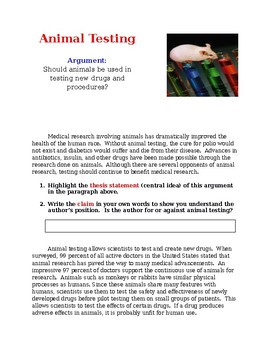Animal testing has long been a contentious issue, stirring fierce debates among scientists, ethicists, and animal rights advocates. The practice, often justified on the grounds of advancing human health, raises profound ethical questions and invites scrutiny into the moral implications of using sentient beings for experimentation. A powerful thesis statement encapsulates the essence of the argument against animal testing: “The ethical ramifications of animal testing—grounded in the inherent rights of sentient beings, the questionable validity of animal models in predicting human outcomes, and the proliferation of viable alternatives—underscore the urgent need for a paradigm shift in biomedical research.” This thesis invites readers to explore the myriad dimensions of the issue while challenging preconceived notions about the necessity of animal testing.
First and foremost, the ethical considerations surrounding animal testing warrant meticulous examination. Animals possess complex nervous systems, capable of experiencing pain, fear, and suffering. Recognizing this capacity for sentience leads to a profound ethical dilemma: can the potential benefits of animal testing ever truly justify the inflicted suffering? The prevailing philosophy of utilitarianism, which advocates for the greatest good for the greatest number, often falls short in the case of animal testing. Many proponents of animal rights argue that the intrinsic worth of an animal should not be overshadowed by a utilitarian calculus favoring human welfare. Thus, adopting an ethical framework that prioritizes compassion and respect for all living beings is essential in assessing the justification for animal testing.
In addition to ethical considerations, it is imperative to scrutinize the validity of animal models in biomedical research. Historically, animal testing has been defended based on the assumption that findings in animal studies can reliably predict human responses. However, a plethora of scientific evidence indicates that animal models frequently fail to translate effectively to human physiology. The rates of failure for drugs tested in animals are alarmingly high; the National Institutes of Health reports that approximately 95% of drugs that pass animal trials fail in human clinical trials due to safety concerns or lack of efficacy. This data compels an analysis of whether the continued use of animal testing is a scientifically sound practice or merely a relic of outdated methodologies that inhibit genuine advancements in medical science.
Another critical aspect often overlooked in discussions about animal testing is the burgeoning landscape of alternative research methods. In light of the ethical dilemmas and questionable scientific validity associated with animal models, researchers are increasingly exploring innovative techniques that do not involve animal testing. Advances in in vitro testing, where human cells and tissues are used, provide a more relevant foundation for understanding human biology and disease mechanisms. Moreover, computational modeling and bioinformatics are redefining the way scientists approach drug development, allowing for predictive modeling that reduces the reliance on animal trials. These alternatives not only align with ethical considerations but also hold the potential to enhance the accuracy of biomedical research, ultimately leading to safer and more effective treatments.
Moreover, the public’s perception of animal testing is shifting, fueled by increased awareness and advocacy regarding animal rights. Documentaries, social media campaigns, and public demonstrations have illuminated the suffering endured by countless animals in laboratories. This growing awareness is prompting a shift in consumer habits, as individuals increasingly seek products that are cruelty-free and companies that are transparent about their research practices. In response, many organizations are pledging to eliminate animal testing altogether, reflecting a significant cultural pivot towards empathy and ethical responsibility.
However, the complexities of transitioning away from animal testing cannot be dismissed lightly. Stakeholders in the scientific community often express concerns regarding regulatory hurdles and the potential for undermining decades of pharmacological research reliant on animal studies. Innovators advocating for change must engage with traditional frameworks, addressing concerns through collaborative discourse and empirical evidence demonstrating the viability of alternative methods. Building bridges between animal rights advocates and medical professionals is crucial for fostering a collective vision of a more ethical and scientifically rigorous future.
Finally, comprehensive education about the implications of animal testing is vital in enabling informed decision-making. The incorporation of critical thinking regarding ethical issues and research methodologies into educational curricula at all levels can empower future generations to question established norms. By fostering an environment of inquiry and moral consideration, society can cultivate advocates for change, ensuring a sustainable shift towards humane treatment of animals in research and beyond.
In conclusion, the debate surrounding animal testing is multifaceted, encompassing ethical dilemmas, scientific validity, alternatives, public perception, and education. A powerful thesis statement serves not only as a springboard for deeper exploration but also as an essential catalyst for change. As society progresses, the urgent need for a paradigm shift in biomedical research becomes increasingly evident. Embracing ethical responsibility and innovative methodologies highlights the trajectory towards a future where human health can thrive without compromising the welfare of animals. In navigating this complex landscape, it is incumbent upon all stakeholders to engage in constructive dialogue, championing both scientific progress and moral integrity.








